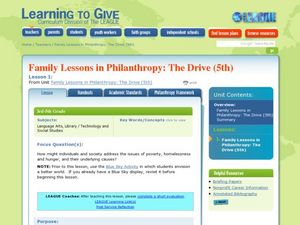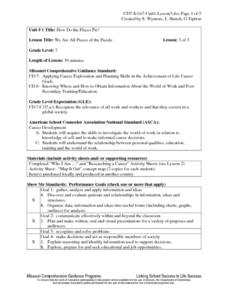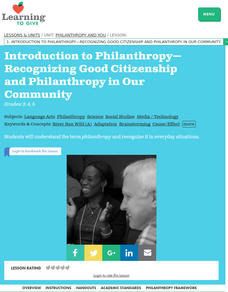Curated OER
Preserving the Memory
Young historians explore ways to help preserve historic battlefields and artifacts. Designed for secondary scholars, the resource focuses on Civil War battlefields and the National Registrar of Historic Places Application. Pupils also...
Teaching Tolerance
Modern-Day Heroes: People Who Are Making a Difference
Not all superheroes wear capes. An engaging lesson delves into the world of modern-day heroes and activists for change. Academics learn there are many different ways to be a hero as well as explore what makes a person a hero. The...
Curated OER
Ireland Facts
In this recognizing facts about Ireland worksheet, learners choose multiple choice answers about the shamrock, Catholic rights in the 1600s, Irish volunteers, the wearin' o' the green, and Queen Victoria awarding the Irish with...
Curated OER
Dance: Cultural Dance Festival
Young scholars participate in a folk dance presentation. In this multi-cultural activity, students and their families work together to learn and perform folk dances at a school sponsored festival. The teacher acts as facilitator, working...
Curated OER
Family Lessons in Philanthropy: The Drive
Young scholars investigate family philanthropy. In this family philanthropy lesson, students review vocabulary such as community, family, service, volunteer, tradition, and caring. They listen to Valerie Flournoy's, The Patchwork Quilt....
Curated OER
Caring for Others - Interview Questions
A worksheet produced by the 4-H organization challenges youngsters to consider seven questions regarding caring for others. They must choose five of the questions, then interview one of their peers by asking them the five questions. One...
Curated OER
We Are All Pieces of the Puzzle
Seventh graders are shown a small puzzle. They are explained that without all the pieces, a puzzle is not complete. Students are explained that the same principle applies to the world of work. They are also explained that each person who...
Benjamin Franklin Tercentenary
Let’s Throw an Electric Science Party!
Are you looking for a shockingly good instructional activity? Check out one that has middle schoolers recreate four of Benjamin Franklin's experiments. Groups investigate, observe, and draw conclusions about static electricity and...
K12 Reader
Reading Comprehension: Uncle Tom’s Cabin
Introduce your high schoolers to one of the most important pieces of American literature with a reading comprehension lesson. As class members read a short passage from Harriet Beecher Stowe's Uncle Tom's Cabin, they learn about the...
Civil War Trust
Civil War Play
Raise the curtain to a class play that depicts the Civil War through both factual information and literary devices. The performance showcases the Battle of Antietam (Battle of Sharpsburg) and brings attention to women's roles, as well as...
Peace Corps
Brief Encounters
How are Pandyas different than Chispas? Explore cultural norms and societal behaviors with an engaging role-play activity. Split into groups of two hypothetical cultural groups, the formal Pandyas and the sociable Chispas, and another...
US Institute of Peace
Identifying Your Conflict Style
How do you handle conflict? Individuals look inward to determine their own conflict style through group discussion and a short quiz. The sixth installment in a series of 15 conflict management lessons examines how our feelings and...
WE Charity
High School–Module 2: Circular Economy and Nature
Everyone's heard the popular slogan reduce, reuse, recycle, but there may be a better way to talk about sustainability. Using the second lesson from the five-part WE Are Innovators—High School Modules series, learners explore issues...
Pace University
Urban Communities
Urban communities are the focus of a series of lessons created to meet specific needs using differentiated instruction. A pre-assessment designates scholars into three groups based on their ability level. Small groups take part in...
Encyclopedia Britannica
Get out the Vote Campaign
While some of your students may be too young to vote, they can get involved in the election process by creating a nonpartisan campaign encouraging voter registration. After researching how to register to vote, class members design PSAs,...
Teaching Tolerance
Participating in Digital Communities
It's possible to promote inclusion and empathy on the Internet—it just takes effort! Scholars read and discuss a short story about being a friend online. Then, pupils role-play appropriate ways to respond to hate within a digital...
Angel Island Immigration Station Foundation
Interview a Family or Community Member: Taking Oral Histories
Young scholars gain insight into how historians record events by engaging in an oral history project. In preparation, class members brainstorm open-ended interview questions and take part in and debrief a mock interview simulation....
Curated OER
We Need More Than Money
Students identify examples of private resources. In this philanthropy activity, students read the book A Chair for My Mother and identify the private resources the characters used in the text. Students name private resources that can...
Curated OER
We Are Divine Creations (Tolerance)
Learners learn ways people volunteer and the ways it helps their self and spirit. In this service project lesson, students define tolerance and study people or organizations who have demonstrated tolerance. Learners then answer questions...
Curated OER
Philanthropy in Your Community
Students brainstorm how an action to benefit others is a type of philanthropy. They
identify the commonwealth approach to philanthropy,
plan and carry out a philanthropic action in their community and
reflect how their action qualifies...
Curated OER
Introduction to Philanthropy-Recognizing Good Citizenship and Philanthropy in Our Community
Students explore the term philanthropy and recognize it in everyday situations. They list three philanthropic activities occurring in their own home, in their classroom, or in their school. Students identify at least one act they might...
Curated OER
Homeless in our Community
Third graders explore homelessness in their local community. In this service project/social studies lessons, children research local areas where homeless people reside, discuss global acceptance and unity, and visit a local food bank.
Curated OER
A Community of Givers
Learners explore charitable organizations. In this character development lesson plan, students read about children who have contributed to charitable organizations, research a variety of these organizations, plan a project, and prepare a...
Curated OER
Get To Know Your Local Philanthropic Organizations
Students develop appropriate interview questions, interview a philanthropic organization, and present information to the class. They use pamphlets and/or other materials gained during their interviews to mount a display about the local...
Other popular searches
- Environment Volunteering
- Volunteering Italy
- Volunteering and Giving
- Kids Volunteering
- Volunteering Lesson Plans
- Economics Volunteering
- Volunteering Worksheets
- Volunteering for War
- Volunteering for a Job
- Volunteering Third Grade
- Volunteering in the Community

























